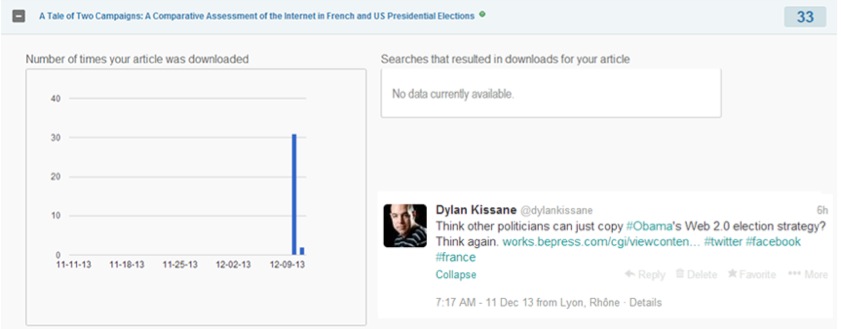Typically professors can imagine their role in the university as having elements in each of three sectors: teaching, research and service. When it comes to teaching and service, the recognition and feedback is generally swift. For example, as a teacher I will meet with my students a couple of times a week over the course of the year with the possibility for feedback from them on my performance every time I walk into class. Similarly, when it comes to service, the journals I edit, referee, review books for, as well as the time I offer to on-campus committees and working groups, sees pay offs in terms of morale and positive feedback rather quickly.
Research is a little different. Sure, the latest work from Walt or Mearsheimer might have a guaranteed audience across the discipline but there is a lot of good work competing for limited eyeballs so invariably a lot of the work – the good, the bad, and the average – gets missed. Knowing this to be the case, one job for a professor is working on getting their research noticed, read and reviewed, and over the past couple of weeks I have been trialling a new way to do just that.
For the last few years I have had my research, including most of my peer-reviewed work, conference papers and public domain work, hosted by UC Berkeley’s electronic repository, bePress. As well as a very reliable hosting platform and some fantastic customer service, bePress also provides extensive tracking data and analytics so that a researcher can track how visitors came to find their research (keywords, websites) and what they viewed and downloaded when they landed on my bePress page.

Overall, the most often downloaded work from my bePress catalogue is a conference paper I presented back in 2007. Funnily enough, that conference paper would eventually be revised into a journal article that is some 2000 downloads behind the original work in progress; I suspect this is related to the title of each piece, with the conference paper more ‘Google friendly’ than the more specific article that emerged from it.
I can also break the download data down further to see articles downloaded in the past month and then again on a day-by-day basis. Doing this reveals a different pattern to the long-term trend.

While the fourth paper is the same – it was linked to in a post by Foreign Policy blogger Joshua Keating which drove downloads significantly higher – the others are not usually popular reads for visitors to my site. Overall the top three papers for December rank only 22nd, 30th and 40th for the number of downloads. So what pushed them to the top of the list this month? In a word: Twitter.
I decided to try promoting some of my research via Twitter with the sort of short, snappy language that a 140 character limit demands. The goal was to point to research that I thought was worthy of reading but that had probably been overlooked in the fight for eyeballs. It proved very effective with downloads of each article shooting up merely on being mentioned in my tweet stream. A 2010 conference paper on the use of social media in French and US elections, for example, had not been downloaded at all in the last month. One tweet with some carefully chosen hashtags, however, and 33 downloads are recorded within only about six hours.

I saw similar results for the other papers I have shared this way, with anywhere between 17 to 30 downloads being typical for a Twitter-promoted paper.
Now I am under no illusions that all 33 of the people who downloaded my conference paper will read it, let alone cite it, but it does help to expose my work to a broader audience and to get eyeballs on my research. Who knows: a re-tweet, a forwarded link, maybe a visit to my bePress site and perhaps even an email to discuss some collaboration?
Twitter is a wonderful tool by which professors can push their research – even the under-recognised and barely-read variety – to a wider audience. I imagine that as the growth in outlets where research can be published continues and as those outlets are more and more often online, the importance of using Twitter and other social media channels to promote IR research will only grow, too.
—
Read more from Dylan Kissane in his e-IR blog Political Business
Further Reading on E-International Relations
- Opinion – Twitter as an Orwellian Global Editor
- Digital Decay and the Global Politics of Virtual Infrastructure
- Hacking Westphalia: ICT Infrastructures, Fake News and Global Politics
- Recognition in Global Politics: The Challenge of Images and Technology
- Dangerous Gaming: Cyber-Attacks, Air-Strikes and Twitter
- The Continuing Russian Campaign to Divide the Democratic Party in the USA